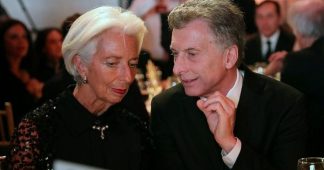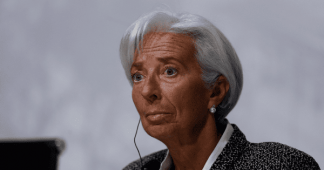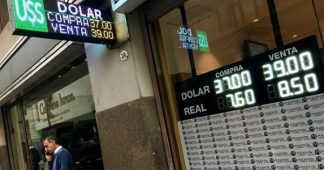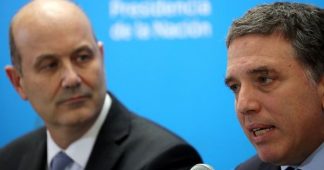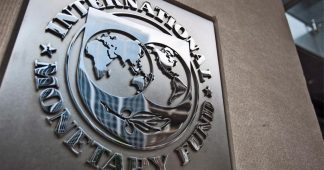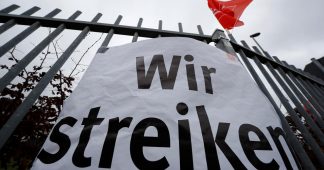By Andrea Lobo
28 September 2018
On Tuesday, all the major cities of Argentina came to a virtual standstill during the fourth general strike against the right-wing government of President Mauricio Macri, as the country’s economy sinks deeper into recession and an inflationary spiral.
During the last three years, millions of Argentines have fallen into unemployment and ever more desperate economic conditions, with one-third of the population and almost two-thirds of children living under the official poverty line, according to the Catholic University of Argentina (UCA). Sixty-two percent of households suffer from the lack of at least one basic human need, whether it is food, health care, education, utilities, housing or access to information.
The government expects inflation to reach 42 percent this year and the economy to contract 2.4 percent, but it has imposed wage increase limits of 25-28 percent, which the trade unions have enforced.
On Wednesday, Macri signed a new $7.1 billion loan with the International Monetary Fund, promising draconian cuts to bring the public deficit to zero. This adds to a series of desperate measures, including a previous $50 billion IMF loan and the hiking of interest rates to 60 percent, with the aim of curbing capital flight.
Enormous social anger was reflected in the strike, which by all accounts had the highest participation yet and brought all public transport, including airports, ports and trucks, vast sectors of private industry and services, along with schools, hospitals, and other services to a halt on Tuesday. Several sectors extended the strike into Wednesday.
Militant student movements have also sprung up in protest against the austerity policies and threats of privatization. Several faculties in the University of Córdoba and University of Buenos Aires, along with high schools in major cities, have seen students strike and carry out occupations of the facilities this month.
Macri’s approval rating, moreover, has fallen from over 50 percent throughout 2017 to 36 percent last month.
The trade union bureaucracies, most of which had agreed to a truce with Macri during the beginning of his term, are containing social anger by calling one-day strikes and walkouts that are mostly sectoral or regional.
The main faction of the General Confederation of Workers (CGT), led by Héctor Daer, continues to support the government, but has threatened further demonstrations against the IMF deal.
Other dissident unions, including the two branches of the Argentine Workers Confederation (CTA) and the Truckers union under Hugo Moyano have begun to consolidate a new front, re-branded last week as the Trade-Union Front for a National Model. For their part, they have threatened “a thousand marches and strikes” to force the ruling Cambiemos coalition to hand power to the Peronist sectors still around the ex-president Cristina Fernández de Kirchner, who began the ongoing austerity drive back in 2014.
During the strike, Macri was in the United States talking to potential investors and negotiating the latest IMF disbursement in the context of the UN General Assembly.
Tuesday night, the Washington-based think tank, the Atlantic Council, handed Macri the “Global Citizen Award 2018.” Far from an honor, the recognition is a warning to Argentine workers and youth opposing Macri’s right-wing policies. The Atlantic Council has provided a platform for strategizing the most vicious war crimes and neocolonial intrigues of US imperialism, and it is currently one of the chief agencies coordinating globally the online censorship of left-wing, socialist and anti-war views.
This gesture is only the latest of a series of steps taken by the US ruling elite to prop up the Macri government. On top of the IMF loan, favorable credit scores by Wall Street and smaller loans from the World Bank, Donald Trump himself has expressed support for Macri’s “engagement.” Accepting the prize, Macri thanked “the level of support that Argentines have received from the world, and especially from the United States.”
The EU European Bank of Investments has also endorsed Macri’s policies and offered special credits.
Despite this political backing and the enormous potential payouts, investors remain skeptical. Argentine newspapers worriedly reproduced a front-page piece in Wednesday’s printed edition of the Financial Times titled “Argentina crisis deepens as bank chief quits after 3 months in post” and warning about the strike and opposition to the “drastic” austerity plans.
This happened two days after Macri himself visited the New York offices of the UK-based newspaper, where he reportedly argued that he had “great popular support.”
Argentina is proving to be one of the weakest links of the international economy, currently the hardest hit by a combination of factors: higher international interest rates, the US trade war against China, the slowdown of the Chinese economy, and higher oil prices, which are expected to jump dramatically from US sanctions against Iran next month. There is also the continued economic crisis in Brazil, Argentina’s main trade partner.
The strong US institutional backing is largely driven by fear of the possible chain reaction and international political and social consequences of a debt default and economic free fall in Argentina.
At the same time, as Trump’s “America First” economic nationalism accelerates the shattering of the global economy into rival spheres of trade, currencies, and military alliances, Washington is seeking to consolidate its control over Latin America, particularly against China’s growing trade ties and massive loans. Speaking to the UN General Assembly on Tuesday, Trump reiterated his government’s intentions to defend US hegemony globally through economic and military means, including against “the encroachment of expansionist foreign powers” into the Western Hemisphere.
The “resignation” of Central Bank chief Luis Caputo reveals some of the deep political and economic contradictions faced by Argentina. Reports indicate that Caputo, a personal friend of Macri, was virtually thrown out by the IMF because the agency opposed his constant selling of foreign reserves, including from the fresh IMF loans, to keep the peso somewhat afloat.
The appointment as Caputo’s replacement at the Central Bank of Guido Sandleris, who has worked at the Minneapolis Federal Reserve, the Inter-American Development Bank and the IMF, demonstrates that Argentina’s economy is increasingly being administrated like the Wall Street-appointed fiscal board that virtually rules Puerto Rico.
From the direct price controls under the Cristina Fernández de Kirchner administration (2007-2015), to Caputo’s sales of foreign reserves, and now to Sandleris—who promises “to leave behind exchange-rate interventions”—Wall Street is ordering an even looser leash to an increasingly unwieldy exchange rate and inflation, in turn allowing for faster capital outflows.
Given the deepening crisis, including the exacerbating influence of the IMF’s policies, the entire house of cards rests on one factor. Earlier this month Michael Camilleri, former Obama-era National Security Council chief for Andean Affairs, told Infobae: “Beyond the specific details of the talks with the IMF, the biggest question at hand is whether president Macri will keep his public support and political space necessary to execute the adjustment plan”—i.e., suppressing political opposition by any means.
The present crisis is shaped by Argentina’s volatile history. During the 1960s, the Onganía military dictatorship froze wages and imposed sharp austerity in response to an incipient downturn in the global economy and a growing debt, which had been largely used to finance a rapid industrialization and growth. Massive social upheavals toward the end of the decade brought down Onganía and four other de facto heads of state.
The 1973 election of Juan Domingo and Isabel Perón led to a short-lived shift back to infrastructure and social spending only allowed by a still thriving industrial export sector aided by a depreciated currency, but that was quickly undermined by the oil crisis that same year.
Throughout the previous decade, the Stalinist, Social-Democratic, Castroite and Pabloite leaderships of the workers movement derailed the increasingly favorable conditions nationally and internationally for proletarian revolution by subordinating radicalized workers and youth behind petty-bourgeois and suicidal guerrilla movements or the bourgeois-nationalist Peronist parties and trade unions.
The Peronist government quickly accelerated spending cuts and political repression until the March 1976 coup that installed a US-backed military dictatorship, which subsequently killed, disappeared and tortured tens of thousands of workers and youth.
The international and national economic conditions are even less forgiving today. Despite the sharp devaluation of the peso, which should make exports more “competitive,” the commercial balance has dropped for 20 months straight and industrial production fell 8.1 percent during the first six months of 2018, compared to the same period last year.
Regardless of whether Macri survives his term, or if Peronism or some “left” populist coalition comes to power, if workers and youth don’t develop an independent and internationalist revolutionary movement against imperialism and the entire capitalist setup in Argentina, including its corporatist trade unions, they will face a future of endless poverty, war, police-military dictatorship and fascism.
